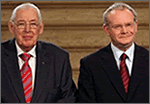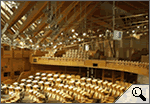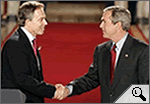|
|
|
|
 |
 |
 > Promoting the Northern Ireland Peace Process > Scotland and Wales > Iraq - Inevitably dimarts, 15 de maig de 2007
'Today I announce my decision to stand down as leader of the Labour Party'. With these words, spoken on 10 May at Sedgefield, in the North of England, where his political career began, Tony Blair announced his intention to stand down as British Prime Minister as of 27 June. Blair's announcement was followed by the start of a campaign within the Labour Party to choose a new leader. The current Chancellor of the Exchequer, Gordon Brown, is expected to be elected as the new leader, with the decision being announced on 24 June.
Tony Blair came to power in 1997, putting an end to 18 years under Conservative governments. Charismatic and aware of the power of image in politics, Blair modernised the Labour Party and made it attractive to middle-class voters, the decisive voters in elections: winning three consecutive elections (1997, 2001 and 2005), something that had never been done before by any Labour politician. During the Blair decade, Britain has experienced remarkable economic growth, although critics emphasise that the difference between rich and poor has increased. However, Blair has succeeded in strengthening the Northern Ireland peace process and returning self-government to Scotland and Wales. On the negative side are the scandals of financial irregularities that have implicated the Labour Party, the erosion of civil liberties in the name of the ‘fight against terrorism’ (London was, of course, the subject of an attack on 7 July 2005 which left more than 50 people dead), and the invasion of Iraq that, more than anything else, has not failed to mark the Blair years.
Promoting the Northern Ireland Peace Process
+ Northern Ireland's first minister, Ian Paisley, and the deputy first minister, Martin McGuinness.
As mentioned above, Tony Blair involved himself very much in bringing about an accord that brought an end to armed conflict in Northern Ireland, where the population is divided between Republicans, who favour a union with the Republic of Ireland, and Unionists, who want Northern Ireland to remain part of the United Kingdom. On 10 April 1998, the Stormont Agreement, or Good Friday Agreement, was signed. The agreement provided a direction for the peace process by proposing self-government for Northern Ireland. It was just a week ago that Northern Ireland saw a historic event: the constitution of a new government made up of two, until recently, conflicting sides: the Democratic Unionist Party and Sinn Fein.
Scotland and WalesIn 1997, the same year he came to power, Tony Blair decided to call two referendums with a view to restoring the Scottish and Welsh parliaments, with voters in both countries coming out in favour. The idea was to put an end to nationalist demands in Scotland and Wales. However, the Parliamentary elections in Scotland this month gave victory to the pro-independence Scottish National Party (SNP) for the first time. In Wales, the Labour Party won, although the pro-independence Plaid Cymru party increased its share of the vote.
Iraq - InevitablyLabour's overwhelming 2001 election victory would in no way foretell the problems the government was soon to have. As a consequence of the attacks against Washington and New Year in 2001, Blair gave his full support to George Bush' US administration in fighting al-Qaeda. Amid massive protests and in the face of UN opposition, the United States and Britain unilaterally invaded Iraq. The inexistence of weapons of mass destruction (the argument used to justify going to war), the post-war disaster and accusations that he misled the people to justify the invasion have greatly undermined the credibility and popularity of the prime minister, who is stepping down two years ahead of expected.
|
Investiga

> Tony Blair, al descobert.

> Deu anys en imatges.

> 2005: tercer triomf electoral consecutiu.

> 18 de novembre de 2006: Blair admet el desastre de l'Irac.
I també...
- El primer ministre britànic, felicitant via YouTube el flamant guanyador de les eleccions presidencials franceses, Nicolas Sarkozy.
- Qüestionari sobre el cap laborista.
- Afeccions i conviccions de Cherie, la muller de Blair.
- L'era Blair, en gràfics.
Portada |
Europa Press |
El Punt |
La premsa |
Especials |
Diari de l'escola |
LesFinances.info |
Editorials |
Mail obert |
Els blocs |
Lletres
Tecnologia i ciència | Solidaritat | Cap de 7mana | Campus | El 9 | Presència | Fòrums | Enquestes | Xat | Correu
Traductor | Edicions en Pdf | Wap-pda | Biblioteca | Lletra més grossa
Tecnologia i ciència | Solidaritat | Cap de 7mana | Campus | El 9 | Presència | Fòrums | Enquestes | Xat | Correu
Traductor | Edicions en Pdf | Wap-pda | Biblioteca | Lletra més grossa
| Què és VilaWeb? Publicitat Mapa web Contacte | Una web de Partal, Maresma i Associats, S.L. |



